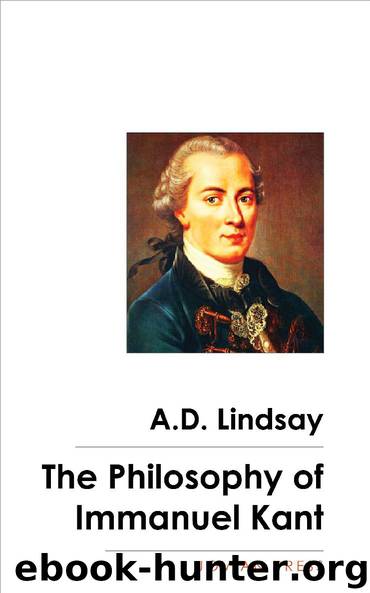The Philosophy of Immanuel Kant by A.D. Lindsay

Author:A.D. Lindsay
Language: eng
Format: epub
Publisher: Pronoun
THE CATEGORIES AND THE PRINCIPLES OF PURE UNDERSTANDING
..................
KANT MAKES THE DISTINCTION BETWEEN perception and understanding depend upon the distinction between the receptivity and the spontaneity of the mind. In the Æsthetic he has been concerned with time and space as elements in what seems to be given to the mind. Before we begin to ask the questions of science, before we analyse, describe, or classify, before we have to think, we perceive. Time and space are not got at by thinking or generalisation. For before we can say anything about any part of our experience, it is given us in a certain spatial and temporal order. If we open our eyes at any moment, we are, without any conscious effort of thought on our part, confronted with an elaborate content. It seems simple to distinguish this receptive attitude of the mind in perception from its activity in thinking.
The distinction is not really so simple as it appears. For we all know that what we perceive depends, at least to some extent, on the mind’s activity. We are familiar with the reflection that men see what they want to see or what they are looking for. This is clearly shown in the case of hearing by the difference in what we hear when we are listening to a language we understand and when we are listening to an unfamiliar language, or in the common experience when, after failing to hear what someone has said, we think what it must have been, and then seem to recall the sound, not as we heard it, but as we should have heard it if we had heard it rightly. Anyone who reflects on the process of fast reading will realise that we do not perceive or notice all the letters on a page; we fill in from our imagination, as we discover when we read words that are not on the page. It is a very hard thing, giving up all interpretation and inference, to describe faithfully just what is there to see.
Passive perception, then, does not exist, and our thought affects our perception. Yet, at the same time, the distinction between thought and perception, although not simple, is real. For although our previous thought affects our perception and we see things already classified, see books, and tables, and chairs, not merely coloured surfaces, yet we can distinguish between simple immediate perception and the process of thought which begins when we ask, What is that? i.e. when we begin to make judgments.
The characteristic of thought, according to Kant, is synthesis, or putting together, and all synthesis is the work of the mind. When we begin to describe and classify the contents of our perception, we pick out separate qualities from the continuous whole we perceive, and group them together. This grouping is, of course, determined by the likenesses and differences which we perceive everywhere, but we do not, in judging, confine ourselves to noticing likeness and difference. For any content of our perception has some point of resemblance, and some of difference with any other.
Download
This site does not store any files on its server. We only index and link to content provided by other sites. Please contact the content providers to delete copyright contents if any and email us, we'll remove relevant links or contents immediately.
Hit Refresh by Satya Nadella(9138)
When Breath Becomes Air by Paul Kalanithi(8447)
The Girl Without a Voice by Casey Watson(7889)
A Court of Wings and Ruin by Sarah J. Maas(7847)
Do No Harm Stories of Life, Death and Brain Surgery by Henry Marsh(6941)
Shoe Dog by Phil Knight(5270)
The Rules Do Not Apply by Ariel Levy(4970)
A Higher Loyalty: Truth, Lies, and Leadership by James Comey(4964)
Hunger by Roxane Gay(4928)
Tuesdays with Morrie by Mitch Albom(4784)
Everything Happens for a Reason by Kate Bowler(4743)
The Immortal Life of Henrietta Lacks by Rebecca Skloot(4589)
Millionaire: The Philanderer, Gambler, and Duelist Who Invented Modern Finance by Janet Gleeson(4478)
How to Change Your Mind by Michael Pollan(4357)
All Creatures Great and Small by James Herriot(4323)
The Money Culture by Michael Lewis(4207)
Man and His Symbols by Carl Gustav Jung(4137)
Elon Musk by Ashlee Vance(4128)
Tokyo Vice: An American Reporter on the Police Beat in Japan by Jake Adelstein(3996)
